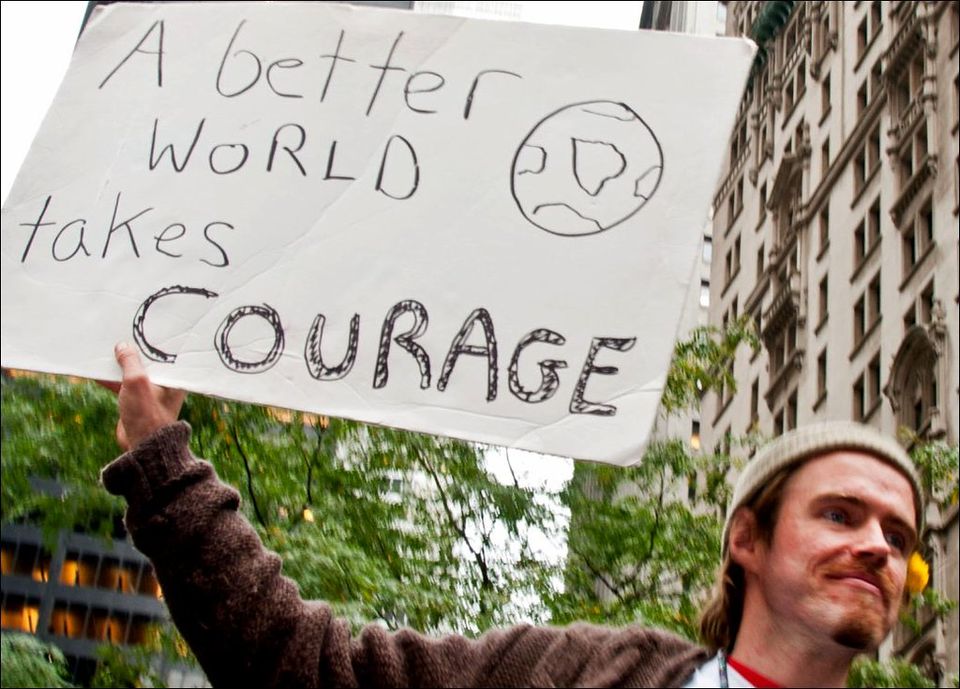Does Courage Matter if You’re on the Wrong Side?

Is courage boldness, bravery, or a compassionate virtue?
Courage doesn’t care what you are doing, it just helps you do it better. Courage is indifferent. Courage is an extraordinary attribute in human beings. But is it a virtue?Steven Gambardella
What follows, is a response I wrote to the general thesis and the quotation above, in Steven Gambardella’s article on Medium, “The Problem with Courage.” It is worth reading before considering the contrasting and complementary ideas found in the Tao Te Ching that I want to bring to the problem and understanding of the meaning of courage.
Gambardella’s article prompted me to find the verses in the Tao Te Ching that I knew spoke to courage or bravery. The first few lines of Verse 73 speak about the mutually arising challenge of “bravery.” I’m referencing the translation, “Tao Te Ching: Zen Teachings on the Taoist Classic.” Lao-tzu and Takuan Soho. (Translated by Thomas Cleary, 2010).
When you’re brave in daring, you get killed;
when you’re brave in not daring, you live.
These two may benefit and may harm.
Who knows the reasons for what Nature dislikes?
Derek Lin’s translation (“Tao Te Ching: Annotated and Explained,” 2011), as a contrast, uses the word “bold” instead of “brave.” What I find interesting to add to Gambardella’s thesis about courage are the comments from both Lin and Soho.
Lin comments,
“Here we have an interesting distinction between courage and daring. Courage means being resolute and firm. Daring means throwing caution to the wind — full speed ahead and damn the torpedoes. The former is an inner quality borne of conviction; the latter is an external display of braggadocio. These two approaches yield different results. The careful resolve brings benefits, while the reckless charge brings harm. It is as if Heaven dislikes those who are rash and punishes them accordingly.”(p. 146)
Soho comments,
”The word “daring” in itself means being bold and resolute, but here, when you look carefully, it refers to initiating challenge and conflict. “Not daring” means not challenging or contending. “Benefit” refers to staying alive. “Harm” refers to being killed.”(p. 173)
The word “courage” in modern usage means, “inner strength,” specifically, “valor, quality of mind which enables one to meet danger and trouble without fear” (source)
This still says nothing about courage as a virtue that is based on right or wrong, but rather, how one acts in accord with one’s inner strength, values, beliefs, and convictions.
In verse 67, the Tao Te Ching provides more understanding about courage relating to compassion as a form of natural balance:
” Compassionate, thus able to have courage…
Now if one has courage but discards compassion…
Then death!
If one fights with compassion, then victory
With defence, then security”Derek Lin
Lin comments on his translation of this verse: “True courage doesn’t come from macho posturing or false bravado. Rather, we gain true courage from love and a commitment to something greater than ourselves.” (p. 134)
“Because of mercy, it is possible to be brave…
Now if one were brave without mercy…
one would die.
Mercy in war means victory, in defence means security.”Takun Soho
Soho comments that the first line “means that compassionate people do not exercise bravery on their own account alone, but exercise bravery with others, so they are brave and strong.” Thus, “what is done without mercy is not bravery with others but individual bravery, so it is dangerous.” (p. 162)
What I take from Gambardella’s thesis and the ideas from the Tao Te Ching, is that courage is a character trait like inner strength or valour. Courage on its own, at the individual level, is possibly closer to that of recklessness or daring.
Having Courage for a “Cause” Moves Into the Ethical Arena.
I don’t know if I’d call it a virtue at this juncture, but it certainly could be seen as such. The challenge with courage is that it is supported or cultivated by the beliefs of the individual and group.
Thus, are hard-core Neo-Nazis as courageous when fighting for their beliefs as LGBTQ+, Jewish and People of Colour who courageously stand up to a Nazi’s bigotry and prejudice? Are anti-vaxers courageous when they protest in front of a politician’s or health official’s home? This feels purely rhetorical and leading on my part.
If we make a connection between courage (mercy, bravery) and compassion, then we have something we can call a virtue.
Soho suggests that “As for mercy…none is greater than compassion” (p. 162). This is especially true if we keep in mind the aspect of the “heart” in the meaning of courage, and the depth of feeling for others (humaneness) in the meaning of compassion. This is what I term, humane-heartedness. For reference, here’s the etymology of courage:
c. 1300, corage, “heart (as the seat of emotions),” hence “spirit, temperament, state or frame of mind,” from Old French corage “heart, innermost feelings; temper”Source
To answer my leading questions above, if courage is a virtue when expressed with compassion, then by definition the Neo-Nazi and the anti-vaxer are not being ethically courageous. Instead, they are reacting from a place of fear and a need to protect their ideological beliefs at all costs, with a complete lack of mercy for all whom they oppose.
IDEA(tion) Practice: Insight + Direction + Emotional Alignment
- What Insight do you take from this discussion of courage?
- How might you apply that insight as a strategy or a Direction in your day-to-day life, or when you encounter a challenging or difficult situation?
- Given that courage implies compassion and a connection with the heart and feelings, what Emotional Alignment can you create with courage? In other words, how do you want to feel about courage in an active sense (see your answers to question 2) so that it will feel natural when you are called upon to be courageous?
Let me know your thoughts in the comments.





Member discussion